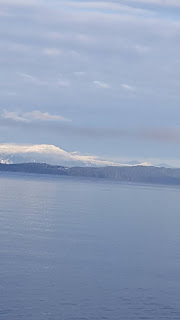Building bridges of understanding with fast-paced prose.
Published in Canada by Pam Withers and Arooj Hayat
Published in 2020
Disclaimer: Pam Withers and I are friends--and she gave me this book to review.
Bronte Miller's dad Frank is a famous war correspondent who covers all of the Middle East. A year ago Bronte moved with her parents to what Frank calls, '"one of the safest neighbourhoods in one of the safest cities in the Middle East."' (p.2)
Bronte loves her life in Alexandria, Egypt. She's actively involved in the Alexandria Parkour Academy and she even has a boyfriend.
Bronte describes Sarfraz, her 'secret boyfriend', as 'gentle and mysterious' (p. 6) Unfortunately, he's rather cold and distant to Bronte--even refusing to be seen with her in public.
When a bomb goes off in their neighbourhood, Bronte's mom Karen drags Bronte back home to Richland, Washington, USA. To put it mildly, Bronte is upset by this uprooting. So much so that Karen can't help but notice. She tells her daughter, '"Have you considered talking to a counsellor, Bronte? You seem to have anger issues, and you're sad and tired a lot."' (p. 31)
On the other hand...
Karam Saif is a new student at Three Rivers High School and is enrolled in Bronte's grade eleven class.
Karam left all he knew in his beautiful city of Aden, Yemen behind him. His entire family was killed as they attempted to flee. He is now alone in what Bronte calls, 'A country that insists in believing that the desperate refugees fleeing from terrorists are the terrorists themselves.' (p. 129) And yet, with unshakable positivity, Karam is eager to embrace his new life.
Karam Saif is a Muslim refugee. Bronte Miller is a white privileged American. Can they build bridges of understanding?
Karam: '"I believe parkour teaches us to incorporate unexpected obstacles without losing stride. It teaches flexibility and resilience and acceptance."' (p. 37)
Pam Withers writes in her Author Notes: 'we [both she and her co-author Arooj Hayat] both hope the book will inspire cross-cultural, cross-religious insight and tolerance.'
Interview with Pam Withers
on Wednesday, February 24
Online Author Reading of...

photo by ldyck
Ice Angel (short story)
by Leanne Dyck
meeting a magical child on a dark night
on Wednesday, February 28
Short Story...
photo by ldyck
Who's Bigger
learning from watching children play
photo by ldyck
Are you following me?
photo by ldyck
Sharing my author journey...
"Where are you from?" is a question I'm eager to answer...
I'm white and have a Canadian accent. At times, I feel like I'm put in a box labelled 'white'. End of story.
When you ask, "Where are you from?" it gives me room to tell the rest of my story.
My dad's dad was born and raised in England. He immigrated to Canada to escape marginalization--marginalization that would have kept him poor and risking his life working in coal mines. He came to Canada and by the sweat of his brow owned and ran a grocery store.
In 1875, a poor economy and severe climatic conditions persuaded my maternal great-grandparents (my mom's grandparents) to immigrate to Canada. They helped to establish the colony of New Iceland between Lake Winnipeg and Lake Manitoba in the province of Manitoba. My mom was assimilated into the dominant culture predominately through school. If she'd spoken Icelandic on school grounds she would have been disciplined with the strap. (Most everyone from the principal to the teachers to the students knew Icelandic.) As a result, she lost most of her first language. When I tried to point out how unjust this was, she justified her school's stance against Icelandic by saying, "We wanted to be Canadian." It saddens me to realize that this was a pretty standard belief back then. Now, however, we realize that diversity makes Canada richer.
I was born and raised in rural Manitoba. Urban Canadians benefitted from opportunities that were never offered to me. I have lived in cities--Winnipeg, Manitoba and Coquitlam, BC--but I'm a ruralite. That's why I live on a remote island. Some people think this makes me lesser--uncultured, ignorant, prejudice.
What is your story?
I want to build bridges of understanding. I want to hear your story. Do you have the right to tell it? Who gives you that right? As an author, can I help you tell your story? If only certain people can tell certain stories isn't that a form of censorship? If only certain people can tell certain stories how far away are we from only certain people being able to read certain books? Are we missing something when we set such limits?
To respectfully represent another culture (ethnicity or disability or gender or...) in literature, you must open your mind to another's reality, that reality becomes your own--if only for as long as it takes you to finish your story. This is a worthy exercise even if your story will never be shared with a reader.





